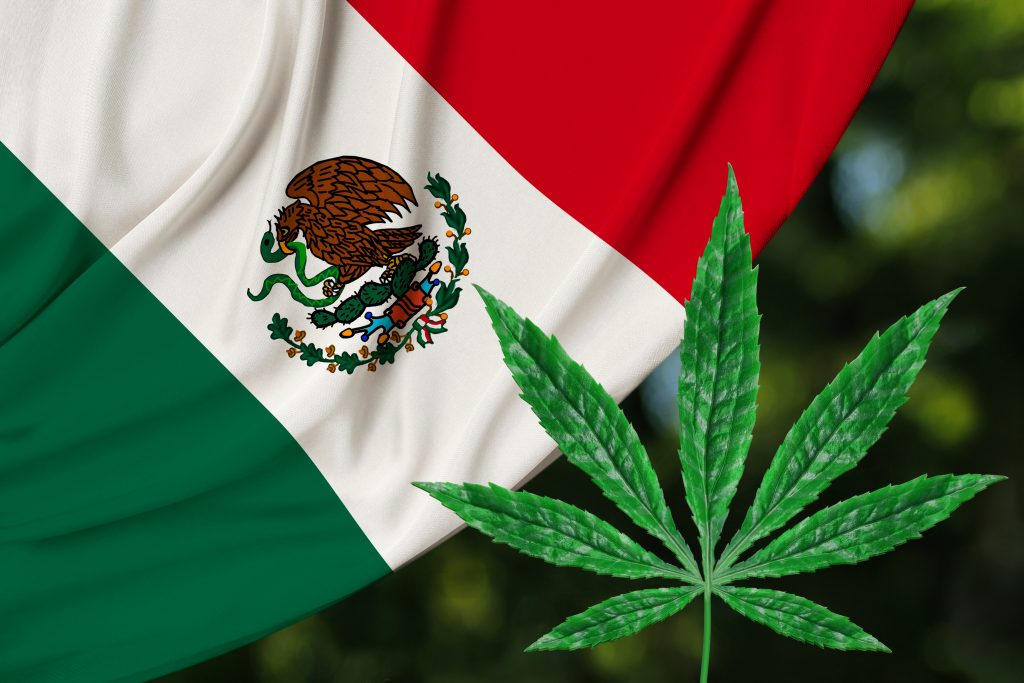As Mexico prepares to open its legal recreational cannabis industry, the question of who will really run it becomes relevant in a country dominated by drug cartels. New reports indicate the Sinaloa cartel is looking to take over Mexico’s new cannabis industry.
Are you the kind of person who stopped using cannabis because the THC was too much for you? Happens to a lot of people. For some, using delta-8 THC provides the same beneficial qualities, but with less anxiety and less psychoactive effect. If this sounds like something you could use, check out these Delta-8 THC deals, and give it a shot for yourself.
Just getting the laws through has proved to be quite a challenge for the Mexican government. Whether this is because of disputes between parties over things like taxation and local farmer protections, or over concerns about how this industry will fit into a cartel dominated country, is hard to say. As the next deadline for legislation looms ahead, reports indicate the Sinaloa cartel has made it clear that when Mexico’s new cannabis industry opens, it plans to take control.
How did Mexico become legal?
Mexico did not establish its new cannabis legality like the other legalized countries. Rather than it pass by way of a bill that makes its way through government, Mexico’s cannabis legalization came through its court system. Due to jurisprudencia in Mexico, if five supreme court rulings are made on a specific topic, that are all the same, and consecutive, the ruling becomes binding for all lower courts. If a court can only rule a certain way, it becomes a legally binding measure. In this case, since the current legislation of the country does not match these supreme court rulings, the legislative arm stands in contradiction to the judiciary arm, requiring an update in laws.
Until this happens, Mexico is left in a strange position. Written laws tell police officers they can bust a person with over five grams of marijuana, but judicially, so long as the cannabis was for personal use, and doesn’t go over about an ounce, the courts cannot find the person guilty of a crime. In fact, they likely won’t even hear the case if it’s a clear-cut personal possession or personal use case. Does this go for all cannabis crimes in Mexico? Certainly not. The old rules still apply both legislatively and judicially. If you’re caught selling marijuana, growing it commercially, or trafficking it around the country or across borders, you don’t get out of a punishment, which could be anywhere from 10-25 years in prison.

In Mexico, due to a 2009 decriminalization measure, amounts of up to five grams of cannabis are allowed, with more than that capable of incurring prison time. Cannabis cultivation is actually the direct subject of the string of court cases that pushed through this legalization. Updates to the Federal Criminal Code have already decriminalized personal cultivation for first time offenders. Other circumstances can incur prison time, since commercial growing is still illegal.
Why hasn’t it happened yet?
The supreme court rulings that established jurisprudencia happened between 2015-2018. The original date for the legislative branch of government to update its laws to be in concert with the court system, was the end of 2019. When this date approached and the laws were not passed, the date was pushed to April 30th of 2020. Due to other issues, perhaps coronavirus related (perhaps not), the date was once again pushed to December 15th 2020. Once again, the Mexican government could not get its stuff together, and it was pushed off yet again until April 30th, 2021.
Of course, since there doesn’t seem to be a measure set that mandates the government to finish by this new date, we have no way of knowing if the government will push it off once again. With mounting pressure from within to solve this legal gray area issue that was created, along with the rest of the world watching Mexico expectantly, it seems there’s added stress put on Mexico to just get it done.
When the government pushed it off this last time, the complaint was about the complexity of the issue, and the need for more time. Of course, with so many places globally that have already set up regulation systems for recreational marijuana, it sounds silly that Mexico can’t seem to figure it out. It’s like the US having the rest of the world to look at for healthcare models, and then complaining about not knowing how to put together a working healthcare system. In both instances, enough information exists on how to do it, and how to deal with different and opposing needs. The better question becomes, is there another reason that this isn’t being done timely or correctly?
The Mexican cartel violence issue
To say that Mexico has issues with cartels and drug violence is the understatement of the year. This implies two things though, one which is often overlooked. The first is the violence itself and the damage to society. The second – while it’s never actually said this way – might be the more important factor to governments, and that’s the lost revenue for governments because of illegal black-market operations being carried out by these cartels. Which really holds more water in the end? Your guess is as good as mine. But let’s take a look at both factors.
According to the Council on Foreign Relations, Mexico has more than 200 drug trafficking cells, which have caused approximately 150,000 deaths since 2006, and are responsible for 150+ deaths of candidates and politicians just leading up to the 2018 election. That last piece of information should be remembered when considering what could be holding up the politicians passing the legislation meant to cut cartels out. In 2018 alone there was a 15% increase in cartel-related homicides, with a whopping 33,341 murders that year. This increased even more to 34,500 homicides in Mexico in 2019 – though this might not all be attributable to cartels. This number stayed about consistent with approximately 34,523 murders in 2020.

This cartel issue stems from the 1980’s when Mexico’s criminals instituted a certain amount of organization between them as a way to split regions, trafficking routes, and to establish new businesses. This wasn’t a smooth operation, and competition between the organizations led to fighting over territories and operations. This was compounded by Mexico in 2006, when the government actively got involved, bringing in the military to combat the cartel violence at the behest of then president Felipe Calderon, and with US backing from the Bush administration.
This strategy was reformed by President Enrique Peña Nieto in 2012, who attempted to move away from more violent measures, instituting policies more directly related to improving public safety and law enforcement reform. This helped for a bit, but went down the drain when a power struggle erupted in one of the biggest cartels – Sinaloa – due to a void left by the final arrest and extradition of the cartel’s leader Joaquin Guzman (aka El Chapo) in 2017. It was around this time that murder rates started increasing to the more recent numbers mentioned previously.
And the money?
Remember that second reason I gave for why governments aren’t so into cartels? They lose a lot of money to them. Period. Like any illegal industry, getting hard numbers is difficult, but there are plenty of estimates for how much money drug cartels bring in – and away from standard markets. There is no standard way to make these estimations, but many studies assess things like drug consumption and the street value of drugs. These numbers (much like murder statistics which vary by publication), are all over the board, ranging from as low as $3.9 billion to as high as $29 billion.
In a report by the UN in 2011, it was estimated that at that time criminal organization revenue globally accounted for an entire 1.5% of the global GDP, which was equivalent to $870 billion in 2009. In a 2017 study conducted by the Global Financial Integrity, a think tank out of Washington, DC, which studies illicit money flows, the approximated retail value of drug-trafficking crimes transnationally was between $426-$652 billion globally.
When it comes to Mexico specifically, according to the White House Office of National Drug Control Policy, the 2006 estimate for cartel income derived from drug trafficking was $13.8 billion from sales to the US alone, with $8.5 billion of that specifically related to the marijuana trade. A 2007 report from the Government Accountability Office put the number at $3.9-$14.3 billion in 2005 for just the marijuana trade, with an average of $15.5 billion for all drug trafficking in Mexico, if taking the midpoint of the range for each drug category.
The Department of Homeland Security in 2010 put the number between $19-$29 billion a year. In a 2011 report, the U.N. Office of Drugs and Crime put the number at $11 billion annually. A Reuters report from 2018 stated cartel revenue is approximately $21 billion per year. Another 2018 report by the Congressional Research Service put the number between $5-$7.5 billion, and a Rand study from 2010 set the range at $6-$8 billion.

It should be remembered that these numbers come from different years, sometimes come from offices or organizations that can benefit from having specifically higher or lower numbers, are not calculated by any standardized measures, and unless noted, apply to all drug trafficking, not just cannabis-related. The one thing outstanding about all these numbers is that they’re very high. No matter which report is closest to fact, the one thing we know is that a lot of money is being made by Mexican cartels.
Will the Sinaloa cartel run Mexico’s new cannabis industry?
It’s hard to know exactly what will happen when transferring an all-illegal black-market industry into an above-board legal industry. Logically, anyone making money off such a black-market industry is probably going to try to find above board ways of keeping that income, should it become untenable to maintain the old system.
Since the 1980’s, one of the biggest and most powerful cartels in Mexico is the Sinaloa cartel. Recent publications have fingered cartel operatives as explaining how the Sinaloa cartel is planning on taking over Mexico’s new cannabis industry by importing stronger strains of cannabis, and finding ways to infiltrate into the legal market.
This really shouldn’t come as a surprise though. If proponents of drug reform actually thought that something like marijuana could be made legal in a place like Mexico, without those who are already cultivating it and selling it finding a way to keep their business, then it doesn’t say much for the intelligence or critical thinking abilities of those in office.
Did someone from the Sinaloa cartel really make these statements? Maybe. Maybe not. Does it matter? No! Because this was always what was going to happen, and once again, anyone surprised by the idea of it, hasn’t been paying attention to history, or reality. In fact, the better question – and concern – is, how bad will these cartels be fighting it out to control this industry? It could very well be that not only will this new legislation not take money away from cartels or curb cartel violence, but that it might increase both earnings for the cartels, and the violence between them. Essentially, this legislation is like a major land grab, and right now, a lot of criminal organizations that have already been working in this vein, are going to want it.
So, will the Sinaloa cartel take over Mexico’s upcoming cannabis industry? Maybe. Maybe not. But the one more sure fact of this matter, is that the cannabis industry, will undoubtedly (I know that’s a big statement…) be run by cartels. Technically this is just my opinion, but very little indicates it would go any other way.
Conclusion
Personally, I expect that one of the biggest issues with Mexico passing this cannabis legislation is the large number of politicians who have been taken out for not acting according to cartel desires. I certainly wouldn’t want to vote for something that might very realistically get me shot in the head. Unfortunately for Mexican politicians, this is the situation at hand. Perhaps the best thing they can do, is not try to stop what is already slated to happen, however weird that may sound to some. After all, it’s not like their measures ever worked in the past.
The Sinaloa cartel will most definitely be trying to take over Mexico’s new cannabis industry, but let’s be honest, so will every operating cartel in Mexico. When the legislation passes, it might be best we all stay inside for awhile.
Welcome to CBDtesters.co, the #1 location for cannabis-related news from around the globe. Drop by frequently to keep up with the exciting world of legal cannabis, and check out our newsletter so you’re always in the know!
Resources
America Is Cannabis Friendly – It’s Official
Will Las Vegas Become the American Amsterdam?
A Brief History Of CBD Mama Cultiva & the Fight for Cannabis Legalization
Plant Power: Everyday Plants That Activate the Endocannabinoid System
What is DELTA 8 THC (FAQ: Great resource to learn about DELTA 8THC)
Argentina Allows Cannabis Self-Cultivation
Uruguay Was The First Country to Legalize Cannabis – How Are They Doing Now?
The CBD Flowers Weekly newsletter (your top resource for all things smokable hemp flowers). How to choose Delta-8 THC flowers? Delta-8 THC Flowers: Everything You Need To Know.
The Medical Cannabis Weekly newsletter (International medical cannabis business report)
Will Mexico Become Biggest Legal Cannabis Market?
The Delta 8 Weekly Newsletter (All you need to know about Delta 8 thc) and the Best Delta 8 THC Deals. Best Delta-8 THC Vape Bundles – Winter 2021 Paraguay Grows it, Brazil Takes it… Will New Cannabis Laws Change Anything?
Is Croatia Trying to Legalize Recreational Cannabis? Recreational Cannabis in Colombia – Coming Soon?
New Bill: Colombia Will Legalize Cocaine?









